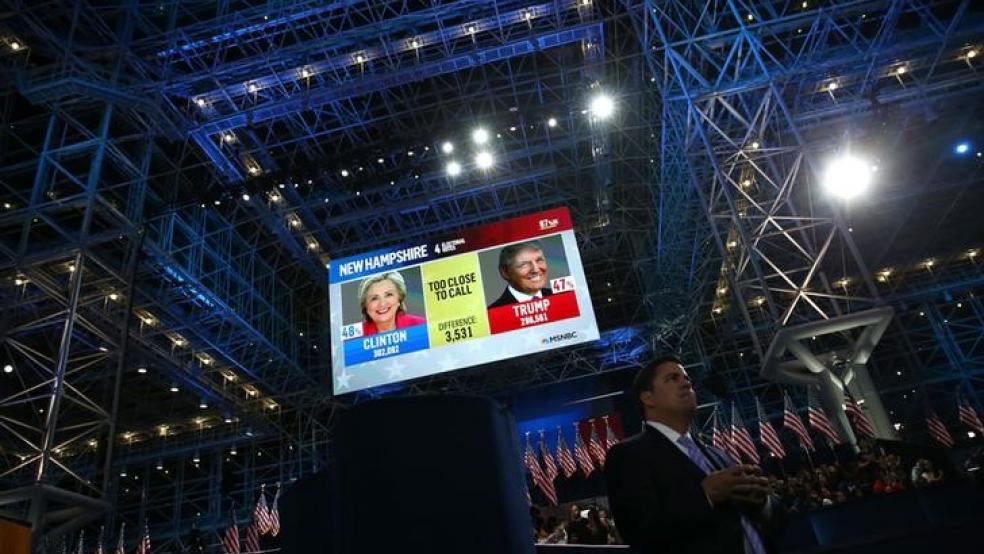Hillary Clinton’s sweep of the latest round of Democratic primaries all but ends the political revolution Bernie Sanders hoped to lead against what he called a “rigged economy” that favored the nation’s wealthy.
On Tuesday, the former secretary of state scored landslide victories in Florida and North Carolina, and bested Sanders in Ohio, Illinois, and Missouri -- three states many believed would go for the democratic socialist’s message of income inequality. Clinton’s camp is breathing a sigh of relief over Illinois, in particular. The former First Lady grew up in the state; a loss there would have been politically and personally embarrassing for her.
Related: Why the Democratic Presidential Race Will Drag On for Months
Overall, the results suggest that Sanders’ surprise victory last week in Michigan was an anomaly, rather than the first domino in a series of friendly Midwest contests that would make him a major threat to Clinton up until the Democratic national convention this summer. Despite the outcome, the Vermont lawmaker has the financial resources and enough dedicated troops to remain in the race throughout the spring.
After her clean sweep of the South--by blow out margins--Clinton added hundreds more delegates making her already healthy total 1,561 (including super delegates) as she marches toward the necessary 2,383 to win. Now, it’s almost mathematically impossible for Sanders to catch up.
With one of the biggest nights of her campaign behind her, Clinton delivered a stirring victory speech in Florida where she tipped her hat to Sanders for his “vigorous” campaigning but quickly pivoted to GOP frontrunner Donald Trump and the bruising general election campaign that awaits the two of them.
Clinton previously only engaged in occasional skirmishes with Trump, usually over his insulting comments on women and immigrants and, most recently, his provocative comments that have encouraged violence at some of his rallies. But she stepped up her attacks in nationally televised appearances, and picked up the tempo last night.
Related: How Tuesday’s Primaries Will Affect Who Controls the Senate Next Year
“We live in a complex and yes a dangerous world,” she said. “Protecting America’s national security can never be an afterthought. Our commander in chief has to be able to defend our country, not embarrass it; engage our allies, not alienate them; defeat our adversaries, not embolden them.”
She cited Trump’s most controversial promises, including his vow to round up and deport 12 million illegal immigrants, ban all Muslims from entering the United States and even authorize waterboarding and other, more painful torture of captured enemies, in violation of current U.S. law.
“When he embraces torture, that doesn’t make him strong, it makes him wrong,” she said. “You know, to be great, we can’t be small. We can’t lose what made America great in the first place,” Clinton added.
But Clinton has her own baggage to deal with in a national election. She is still considered “untrustworthy” in most polls—a character flaw that will certainly be exploited by the Republican nominee.
Sanders now faces the reality of becoming nothing more than a messaging candidate, using his bid to keep the spotlight on the bread-and-butter issues that have been the hallmark of his dark horse candidacy.
Related: It Took Trump to Bring Obama and GOP Leaders Together
He certainly has the money to stay in the race, outraising Clinton in February $42 million to $30 million. The real question facing the 74-year-old lawmaker is will he use the campaign apparatus he has created to pull Clinton further to the left, tear her down with attacks or try to bring the disparate wings of the Democratic Party together.
As the votes rolled in Tuesday there certainly seemed to be the sense that the race had passed Sanders by. Perhaps proving the old adage that “the revolution will not be televised,” none of the three major cable news networks carried Sanders’ primary night speech in Arizona.
Sanders spoke for an hour, without mentioning the night's election results.
"We have come a long way in 10 months. And the reason that we have done as well as we have, the reason that we have defied all expectations, is that we are doing something very radical in American politics -- we are telling the truth,” he told the crowd. “And the truth is ... not always pleasant, is not always what we want to hear. But we cannot go forward unless we deal with the realities of American society today, and that is what we are going to do.”
Exit polling in Ohio highlights both the former secretary of state's strengths and weaknesses moving forward. Clinton romped among middle-aged and older voters, as she did in other states, but was crushed by Sanders among those 18 to 29. She claimed the support of 68 percent of black voters -- one of her key constituencies nationally -- while doing only slightly better than Sanders among whites, 51 to 48 percent.
Sen. Sherrod Brown (D-OH) was of huge importance to Clinton’s victory in the Buckeye State and serves as one of her most important bridges to the liberal wing of the party. He strongly denies he has any interest in becoming her running mate, but there’s already speculation that he will be on her short list.
On issues that matter most to voters, Sanders stood out with 63 percent of those focused on income inequality, one of the Vermont senator's central campaign themes. But the former first lady dominated among those most worried about terrorism, the economy and jobs and health care. And perhaps most tellingly, 81 percent of those looking for a candidate who can win in November chose Clinton.
The decisive primary now turns to another small tranche of states, with primaries in Arizona and Utah and a caucus in Idaho happening on March 22. Alaska, Hawaii and Washington state hold contests on March 26.






